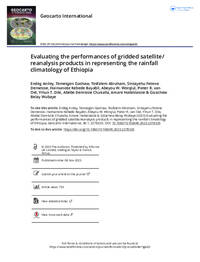Evaluating the performances of gridded satellite/ reanalysis products in representing the rainfall climatology of Ethiopia

Authors:
This study evaluated performances of the Climate Hazard Group Infrared Precipitation with stations version 2.0 (CHIRPS v2.0) and Multi-Source Weighted-Ensemble Precipitation version 2.8 (MSWEP v2.8) products against observed data. Rainfall climatology was simulated for different agro-ecological zones (AEZs) of Ethiopia during
1991–2020 at different temporal scales. Performance evaluations were made using continuous and statistical performance measures as well as Probability Density Function (PDF). CHIRPS v2.0 for estimating monthly, seasonal, and annual rainfall totals, and MSWEP v2.8 for daily rainfall have shown better performance over
all AEZs. The two products display comparable performance for detecting daily rainfall occurrences over alpine AEZ, but MSWEP v2.8 is superior in the rest four AEZs. CHIRPS v2.0 outperforms MSWEP v2.8 for detecting most of the daily rainfall intensity classes over all AEZs. The findings will play a noteworthy role to improve the quality of hydro-climate studies in Ethiopia.
